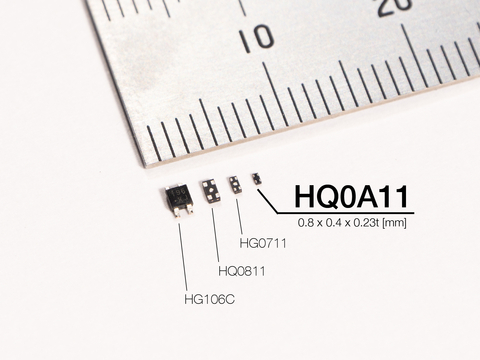Asahi Kasei Microdevices (AKM) has launched mass production and shipment of its next-generation InAs (indium arsenide) compound Hall element, the HQ0A11. Launched in November 2024, HQ0A11 features AKM’s smallest and thinnest* package size for an InAs-based Hall element, measuring 0.8 x 0.4 x 0.23 mm. It achieves an 85% reduction in volume compared to the previous model of HQ0811 in the high-sensitivity HQ series. It is expected that HQ0A11 will contribute to improved performance in smartphone camera modules, small robots, and other applications.
This press release features multimedia. View the full release here: https://www.businesswire.com/news/home/20241204456865/en/

Size comparison of AKM Hall elements (Photo: Business Wire)
* HQ0A11 is smaller and thinner than the HQ0811 (1.6 x 0.8 x 0.38 mm), which was previously the smallest and thinnest high-sensitivity Hall element. It also has an approximately 16% better S/N (signal-to-noise) ratio, which directly correlates to position detection accuracy, than HQ0811, which previously had the highest S/N performance in the HQ series.
|
|
HG series |
HQ series |
|
Compound materials |
Gallium arsenide (GaAs) |
Indium arsenide (InAs) |
|
Features |
Excellent thermal characteristics; excellent linear output even under strong magnetic fields |
High sensitivity with higher electron mobility than the HG series |
Hall elements are used to detect magnetic fields (magnetic flux density). AKM started its Hall element business in 1974 with the development of sensors for automobile airbags. While advancing its development and manufacturing expertise to meet evolving market needs, AKM has shipped over 50 billion Hall sensors to date, including both Hall elements and Hall ICs.
Hall elements are often used for the position detection that is needed for image stabilization and autofocus in smartphone cameras. The demand for enhanced functionality and higher-resolution capture in cameras requires an increased component count within the same (or smaller) form factor, creating a growing need for ultra-compact products that enable high-density component mounting in a limited space.
HQ0A11 achieves the highest S/N performance among AKM products for position detection by leveraging the characteristics of InAs. Its position detection accuracy is over 3.5 times higher than that of the HG0C11, a GaAs (gallium arsenide) Hall element which has been a mainstay product for camera modules. As such, HQ0A11 can significantly reduce the lens-shake effect that often occurs with smartphone cameras, especially with telephoto lenses.
AKM will continue to leverage its proprietary compound semiconductor and packaging technology in order to further contribute to the miniaturization and higher performance of electronic products such as smartphones, small motors for robots, and many other applications.
Features of HQ0A11
1. The smallest and thinnest package size among AKM’s InAs Hall elements
AKM’s smallest and thinnest package size of 0.8 x 0.4 x 0.23 mm enables increased flexibility in design for applications with limited space for mounting, such as smartphone camera and lens modules, etc.
2. High S/N performance enables more precise lens position control
S/N performance over 3.5 times higher than the HG0C11 Hall element, the present mainstay product for camera modules. The HQ0A11’s high sensitivity also makes it suitable for applications such as paper thickness detection.
3. Stable operation
Since the Hall element does not contain magnetic materials, there is a low risk of failure and malfunction due to adsorption or changes in magnetic field strength. This allows for stable operation even in environments such as the vicinity of motors.
AKM’s Hall sensor business
Since the launch of its Hall sensor business, AKM has supported people’s lives with brushless DC motors, electronic compasses, current sensors, etc., while assisting customers’ designs by leveraging its accumulated expertise in the temperature characteristics of compound semiconductors and magnetic simulations. Early on, it was AKM that proposed using multiple Hall sensors to achieve high-precision position detection over long distances by canceling temperature characteristics.
About Asahi Kasei Microdevices (AKM)
AKM, a Japan-based company, operates an electronic components business as a member of the Asahi Kasei Group’s Material sector. AKM provides customers with unique products by combining the compound semiconductor technology used in magnetic sensors with the ASIC/analog circuit technology used in silicon semiconductors. AKM’s unique products and solutions are featured across a wide range of markets, including mobile communication devices and consumer products, as well as automotive electronics devices, household equipment, and industrial equipment.
Additional information is available on https://www.akm.com/global/en/.
About Asahi Kasei
The Asahi Kasei Group contributes to life and living for people around the world. Since its foundation in 1922 with ammonia and cellulose fiber business, Asahi Kasei has consistently grown through the proactive transformation of its business portfolio to meet the evolving needs of every age. With more than 49,000 employees worldwide, the company contributes to sustainable society by providing solutions to the world’s challenges through its three business sectors of Material, Homes, and Health Care. For more information, visit www.asahi-kasei.com.
Asahi Kasei is also dedicated to sustainability initiatives and is contributing to reaching a carbon neutral society by 2050. To learn more, visit https://www.asahi-kasei.com/sustainability/.
View source version on businesswire.com: https://www.businesswire.com/news/home/20241204456865/en/